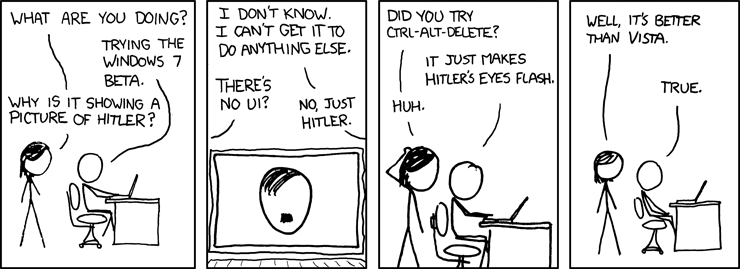I’ll do you one better. The hardest part of making crap people like is the damn people. I have been a product manager for a decade and I can confidently say if I deliver exactly what the customer asks for I would be an utter failure. Requirements and software that fulfill what a customer says they want will ultimately lead to them asking for something they previously didn’t realize because it actually turns out they have no idea what they want, have an agenda, or the conditions have shifted from under you and what they said no longer holds water.
I could go on a tirade about this but my two cents is you gotta listen to what everyone says, but assume they are a human at the end of the day. It’s too damn easy for me to suck up dev time with what people want. Hell, just one word can keep a dev team busy for a long time. Internationalization! Boo!
I also need to build an environment where the dev team doesn’t despise the business due to a history of constantly shifting goalposts, borderline abusive metrics, and expectations that just create a battered development team. For some reason hiring a PM aligns with an org hitting the point where the original dev team has lost critical members because of terrible burnout and a culture of blaming people and not process. Takes a lot of therapeutic communication to remedy that.
TLDR; People. People are the reason all things are difficult.
I’m almost 40 and very slowly educating myself toward a CS degree outside of work. I feel like I’m so far behind you guys that my only way into the tech industry with decent compensation (>100k) to match my current position will be through my management history, soft skills, and general understanding of people. My current position is very much a diplomat between the people getting the work done and the the people who want it done (then helping to get it done). Your post is very relatable even though I’m in a different industry. It gives me a little hope that some of my skills are transferrable even without a paper on the wall.
As you age, soft skills become way more important IMO. It’s almost impossible to keep up with the changing technology landscape, and while you could theoretically become an expert in some tech that never goes away (hello Cobol), eventually it will become obsolete and you’re left with no marketable skills.
And while some people are lifelong learners (I am), learning new programming languages over and over again gets old at some point. So transitioning into more of a people’s role (like management) it’s a good move when you get older.
And if AI keeps getting better at coding, some programming jobs could be in danger of automation, so it’s also a safety net for that scenario.
it’s the fucking humans
“Did I say ‘we want it to do this OR that?’ I meant we wanted it to do this ‘AND’ that!” 🤦♂️
Someone tell my boss this, they don’t understand agile. They think we can “start the process” of developing a solution before we’ve understood a single thing about what the customer needs.
And it’s not that we don’t have 100% of the requirements either. It’s basically a we don’t talk to the customer or perform market research to know where we should take the product, so I’m going to make up features at an absurdly abstract level and no you don’t need to meet to talk about it, just start working. “The requirements will come later”, they say. From whom exactly? 🤔
I feel this pain. My last assignment we went through all the process of grooming and story pointing, but the documentation was voluminous and we were all expected to be 100% conversant in each story. Then a story would take hours to groom and the testers weren’t exactly sure how to test it, so the developers would have to basically write the end-to-end test cases along with detailed explanations of what could and couldn’t be tested (arbitrary xml format, so some things you had to change independently to test, while other things would never be changed independently in prod so they weren’t valid to test. Also, sometimes the correct thing to do would be determined by the database schema (is nullable?) which would lead to vastly different behaviors.
And lastly, we had to commit to delivering these features on time and to let everyone know ASAP if a timeline was under threat. Well, sometimes I’d tell them the timeline was under threat before the sprint was even started. That pissed them off something fierce because then it made us look incompetent to the customer - well… if the truth hurts, fix something in leadership. Also we were expected to do “whatever it takes” to deliver stories on time. Whatever it takes means skipping the grooming stories and reading the documentation for the next feature because I have to get this feature out the door.
I’ve never worked in the game development industry, but stories like this are what has kept me out of it. “Crunch time” that lasted months? Fuck that. I’m fifty years old with 25 years experience. I have kids at home. I work my ass off for about 9 hours a day and every once in a while a little more, but I’m not about that fucking lifestyle over shitty business software to make a shitty business more shitty money.
So needless to say I’m between jobs at the moment… I’m so over terrible leadership.
I can sympathize with a lot of the struggles you’ve endured. I deal with a lot of the same things and I’ve started to look elsewhere because for a company of 15, this place is run like a train wreck.
Just got off my stand up meeting too, we have to cancel todays grooming session because the project manager is on vacation. How will we survive without them repeating buzzwords and nodding like they understand what we’re talking about??? No shared responsibility for this team. It’s back to the waterfall method; and my boss likes throwing rocks off of the cliff. Every man for themself!
okay, I’ve finished your software, it meets your zero requirements!

“Add support for another vendor”
“Okay I understood what you wanted perfectly without any context, I’ve also compiled, pushed, and upgraded your customers”
Some people think it will really be that easy. Maybe 50 years from now, but not with these generative models lmao.
“We shall make solutions to problems people don’t even know they have!”
“What people?”
“All people! Including us!”
Exactly. We’re not inventing an iPhone or anything. Extremely niche software that is losing market space every month while the PM’s sit around and prioritize the wrong things, there’s no strategy.
THIS
Do you work with me? My boss refuses to do a market research, refuses to check our website usage, change features that users actually care about, because he doesn’t seem value on it.
And good lord, i have to create a dashboard to show our analytics, but he doesn’t talk exactly what is needed. I spoke multiple times, said what i needed from him and he still doesn’t know
Analytics? Customer empathy gathering? Market research? Why bother? They just saw a post on LinkedIn about a Blockchain ChatGPT AI Machine Learning NFT. You really need to keep your eye on the ball on how we can work together to shoehorn any of that in the product so I can seem smart posting it on LinkedIn too. I’m never gonna hit CEO gaining market insight. Gotta fleece everyone with the most fancy sounding thing I have no clue about today. Don’t worry. I’ll forget by the time you have it released and complain about the new maintenance burden though. We need more features!!!
It’s coming with names
But coding seems quite literally like modeling those requirements.
I think he’s missed a potential benefit of AI.
He seems to be speaking mostly of greenfield development, the creation of something that has never been done before. My experience was always in the field of “computerizing” existing manual processes.
I agree with him regarding the difficulty of gathering requirements and creating specifications that can be turned into code. My experience working as a solo programmer for tiny businesses (max 20 employees) was that very few people can actually articulate what they want and most of those that can don’t actually know what they want. The tiny number of people left miss all the hacks that are already baked into their existing processes to deal with gaps, inconsistencies, and mutually contradictory rules. This must be even worse in greenfield development.
That is not saying anything negative. If it were any other way, then they would have had success hiring their nephew to do the work. :)
Where I think AI could useful during that phase of work is in helping detect those gaps, inconsistencies, and contradictory rules. This would clearly not be the AI that spits out a database schema or a bit of Python code, but would nonetheless be AI.
We have AI systems that are quite good at summarizing the written word and other AI systems that are quite good at logical analysis of properly structured statements. It strikes me that it should be possible to turn the customers’ system descriptions into something that can be checked for gaps, inconsistencies, and contradictions. Working iteratively, alone at the start, then with expert assistance, to develop something that can be passed on to the development team.
The earlier the flaws can be discovered and the more frequently that the customer is doing the discovery, the easier those flaws are to address. The most successful and most enjoyable of all my projects were those where I was being hired explicitly to help root out all those flaws in the semi-computerized system they had already constructed (often enough by a nephew!).
I’m not talking about waterfall development, where everything is written in stone before coding starts. Sticking with water flow metaphors, I’m talking about a design and development flow that has fewer eddies, fewer sets of dangerous rapids, and less backtracking to find a different channel.
Removed by mod






